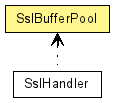 org.jboss.netty.handler.ssl.SslBufferPool
org.jboss.netty.handler.ssl.SslBufferPool
|
||||||||||
| PREV CLASS NEXT CLASS | FRAMES NO FRAMES | |||||||||
| SUMMARY: NESTED | FIELD | CONSTR | METHOD | DETAIL: FIELD | CONSTR | METHOD | |||||||||
java.lang.Objectorg.jboss.netty.handler.ssl.SslBufferPool
public class SslBufferPool

A ByteBuffer pool dedicated for SslHandler performance
improvement.
In most cases, you won't need to create a new pool instance because
SslHandler has a default pool instance internally.
The reason why SslHandler requires a buffer pool is because the
current SSLEngine implementation always requires a 17KiB buffer for
every 'wrap' and 'unwrap' operation. In most cases, the actual size of the
required buffer is much smaller than that, and therefore allocating a 17KiB
buffer for every 'wrap' and 'unwrap' operation wastes a lot of memory
bandwidth, resulting in the application performance degradation.
| Constructor Summary | |
|---|---|
SslBufferPool()
Creates a new buffer pool whose size is 18113536, which can
hold 1024 buffers. |
|
SslBufferPool(int maxPoolSize)
Creates a new buffer pool. |
|
| Method Summary | |
|---|---|
int |
getMaxPoolSize()
Returns the maximum size of this pool in byte unit. |
int |
getUnacquiredPoolSize()
Returns the number of bytes which were allocated but have not been acquired yet. |
| Methods inherited from class java.lang.Object |
|---|
clone, equals, finalize, getClass, hashCode, notify, notifyAll, toString, wait, wait, wait |
| Constructor Detail |
|---|
public SslBufferPool()
18113536, which can
hold 1024 buffers.
public SslBufferPool(int maxPoolSize)
maxPoolSize - the maximum number of bytes that this pool can hold| Method Detail |
|---|
public int getMaxPoolSize()
public int getUnacquiredPoolSize()
0, it means the
pool is getting exhausted. If it keeps returns a unnecessarily big
value, it means the pool is wasting the heap space.
|
||||||||||
| PREV CLASS NEXT CLASS | FRAMES NO FRAMES | |||||||||
| SUMMARY: NESTED | FIELD | CONSTR | METHOD | DETAIL: FIELD | CONSTR | METHOD | |||||||||